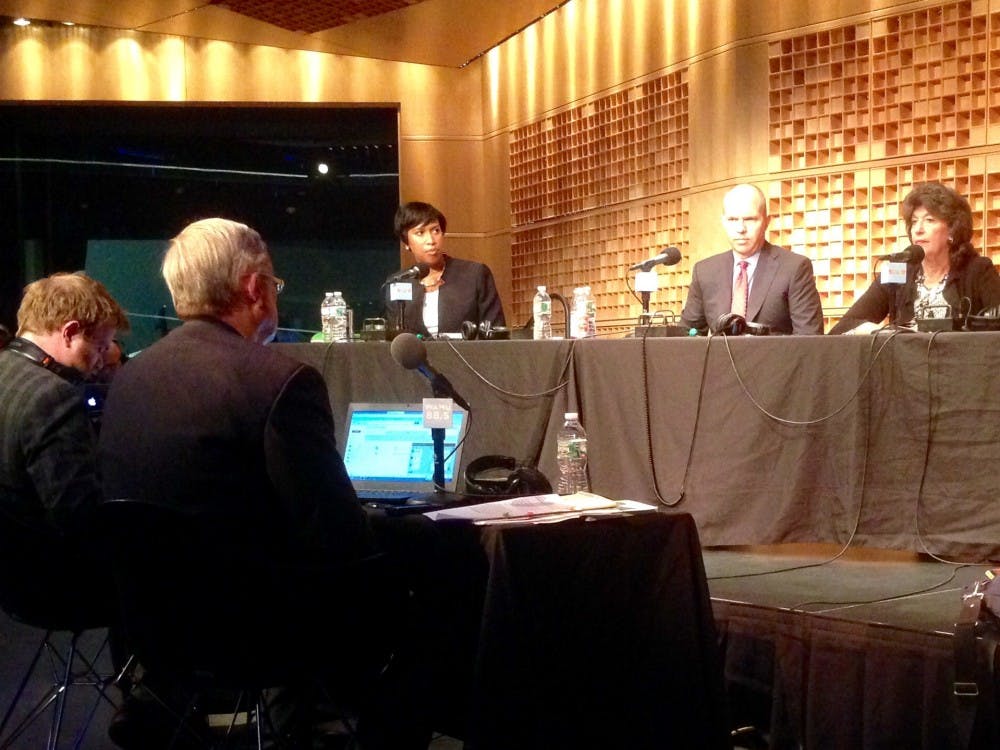When D.C. mayoral candidates Muriel E. Bowser (D), David A. Catania (I) and Carol Schwartz (I) gather for a debate, arguments about their past run as deep as their differing visions for the city.
At their latest debate on Oct. 2 hosted by WAMU 88.5 at NPR, the three sparred over affordable housing, employment and education, among other topics. WAMU’s Kojo Nnmadi moderated the forum with a media panel of NBC4 reporter Tom Sherwood and WAMU 88.5 reporter Patrick Madden.
Catania criticized Bowser for not spending enough money to build and preserve affordable housing units as chairperson of the Committee on Economic Development. Bowser hit back by saying that she will spend $100 million a year as mayor in order to alleviate affordable housing troubles. She also touted the importance of creating new affordable housing communities.
Schwartz, who said affordable housing is one of the reasons she is running for mayor, sympathized with residents who have been priced out of D.C. She said she wants to bring back “Ward 9,” referring to residents who have left for less expensive housing in areas such as Prince George’s County, Maryland.
The debate, although less feisty than the first debate of the season at AU, still had testy moments. And before issues such as homelessness and education could be discussed, the candidates needed time to talk out the past, including Catania’s history as a Republican.
“The Republican party that existed when I grew up doesn’t bear any resemblance to the party now,” he said.
He added that he tried to engage the party on urban and housing issues to seemingly no avail. Catania, who is gay, said the party’s opposition to LGBT rights and same-sex marriage led him to quit the GOP a decade ago.
Schwartz is also a former Republican and former friend of Catania. In 2008, Schwartz lost her at-large council reelection campaign, which Bowser and Schwartz claim Catania had a hand in. Catania pushed back on claims that he helped engineer opposition to Schwartz, which upset Bowser.
“Even though I can’t look upon David with great fondness anymore because of the nasty personal attack that went on in 2008, I am not running having anything to do with you,” Schwartz said to Catania. “And I want to say that to your face.”
A day before the debate, a new poll commissioned by Economic Growth DC had Bowser’s lead at 8 percentage points over Catania. The results suggest a tighter race than previous polls, which seemed to embolden Catania on the night. An NBC4/Washington Post/Marist poll from September had Bowser with a 17 point cushion over Catania.
Catania, who said he has the most “progressive record” out of his counterparts, took the opportunity to again criticize Bowser’s legislative record as Ward 4 councilmember.
“I’ve had enough of Catania and his ‘uninformed’ and ‘she doesn’t have the intellect’ and ‘she’s not smart,’” Bowser said when Catania criticized her education plan.
On the issue of employment, Bowser said she wants to incentivize contractors to create jobs for the neediest D.C. residents, in addition to expanding the Summer Youth Employment Program to 24-year- olds. She pushed back on claims that job training programs always produce outcomes, saying that there are no checks on whether or not these programs have any “appreciable” change.
When District voters go to elect their new mayor Nov. 4, they will also decide if they want to vote for the legalization of marijuana. Bowser and Catania both reiterated their support for Initiative 71, the name for the ballot measure. Schwartz said she opposes legalization.
The next mayoral debate, sponsored by The Washington Post and NBC4, will be on Oct. 15.





